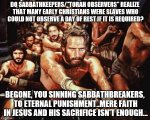We are called to celebrate the day of Yahushua's (Jesus's) resurrection. Let me show you. First we need to understand why the Messiah rose from the dead when He did, but first you have to understand when and why He was crucified for us. Yahushua was crucified on the Passover{Thanks you made me research it more, see below.}, and was and is our Passover lamb. Leviticus Chapter 23 explains Yahweh's feast days for us. We are told that the day after the Passover is the first day of "unleavened bread", it is a Holy day considered a Sabbath day. We are also told that after the first day which comes after the Weekly Sabbath day (Seventh day of the Week) after the Passover day is another Holy day called "first fruits". It is on that day that the children of Israel were to bring a "Sheaf" of grain, being the first ripe stalks of barley grain from their crops, and present it as a "wave offering" to Yahweh at the Temple. It represented the first of all the harvest that Yahweh (God) would bless the people with. Yahushua rose from the dead on that same day, He became the "first fruits of the dead" as He was risen up from the grave and presented before the Father in Heaven. It is in the Keeping of Yahweh's Holy Days that we find true Worship, both of Yahweh and His Son Yahushua. In truth believers were never told to worship every first day of the week (Sunday) It is hard to accept for some but this is a tradition of men based off of pagan rooted practices. It's not wrong to worship on Sunday, or any given day, but Christianity has replaced Yahweh's Holy Days with their own man made institutions. We are still called to Keep every Sabbath, and every Holy Day {Chapter and Verse Please}, and indeed every Word that proceeds from the mouth of Yahweh, for it is by that that we live.
Deuteronomy 8:3 and Matthew 4:4
He, Yahushua, was the fulfillment of that great Feast/Holy Day, and when you celebrate that Day every year you are celebrating His resurrection.
Deuteronomy 8:3 and Matthew 4:4
He, Yahushua, was the fulfillment of that great Feast/Holy Day, and when you celebrate that Day every year you are celebrating His resurrection.
Jewish law FORBADE a body hanging on the Cross on the First Day of the Feast of Unleavened Bread, because that Day, (always Nissan 15th) is always considered a HIGH HOLY SABBATH, and it has the same laws and regulations applied to that day as the weekly Sabbath. Ask any Jewish Historian, and you will find out that because Nisan 15th is considered a High Holy Sabbath, the lambs for the Passover meal were ALWAYS slaughtered on Nisan 14th, (also known as Preparation Day), between 3 P.M. and 5 P.M. Nisan 14th in the year 33 A.D. fell on a Thursday. Yes, that means JESUS celebrated the Passover at the earliest time possible, some time after sundown on 13th, which in the Jewish way of counting a Day is the beginning of the 14th of Nissan, which is Passover, because HE KNEW that He would be in the TOMB by Sundown that next day, the start of Feast of Unleavened Bread. I suspect that most people celebrated the Passover Seder at or shortly before Sundown on the 14th of Nisan.
John 19:30-31 (NKJV)
[SUP]30 [/SUP] So when Jesus had received the sour wine, He said, "It is finished!" And bowing His head, He gave up His spirit.
[SUP]31 [/SUP] Therefore, because it was the Preparation Day, that the bodies should not remain on the cross on the Sabbath (for that Sabbath was a high day), the Jews asked Pilate that their legs might be broken, and that they might be taken away.
Leviticus 23 gives us the important and “missing” information in the traditional teaching. Because we have not bothered to put the New Testament account into its Old Testament framework, we have misunderstood and misconstrued the events of the Passover season in which Y’shua died and was resurrected. Therefore, to understand what happened, let’s look at this missing info.
[SUP]5[/SUP]In the first month, on the fourteenth day of the month at twilight (*when God says a new day begins) is Yahweh's Passover.
[SUP]6[/SUP] 'Then on the fifteenth day of the same month there is the Feast of Unleavened Bread to Yahweh; for seven days you shall eat unleavened bread.
[SUP]7[/SUP] 'On the first day you shall have a holy convocation; you shall not do any laborious work.
[SUP]8[/SUP] 'But for seven days you shall present an offering by fire to Yahweh. On the seventh day is a holy convocation; you shall not do any laborious work.'" Leviticus 23:5-8 (*my commentary)
The Two Sabbaths of Passover
[SUP]5[/SUP]In the first month, on the fourteenth day of the month at twilight (*when God says a new day begins) is Yahweh's Passover.
[SUP]6[/SUP] 'Then on the fifteenth day of the same month there is the Feast of Unleavened Bread to Yahweh; for seven days you shall eat unleavened bread.
[SUP]7[/SUP] 'On the first day you shall have a holy convocation; you shall not do any laborious work.
[SUP]8[/SUP] 'But for seven days you shall present an offering by fire to Yahweh. On the seventh day is a holy convocation; you shall not do any laborious work.'" Leviticus 23:5-8 (*my commentary)
The Two Sabbaths of Passover
You are Correct, Firsts Fruit Wave Offering was always on a Sunday.
Leviticus 23:10-11 (ASV)
[SUP]10 [/SUP] Speak unto the children of Israel, and say unto them, When ye are come into the land which I give unto you, and shall reap the harvest thereof, then ye shall bring the sheaf of the first-fruits of your harvest unto the priest:
[SUP]11 [/SUP] and he shall wave the sheaf before Jehovah, to be accepted for you: on the morrow after the sabbath the priest shall wave it.
Last edited:






